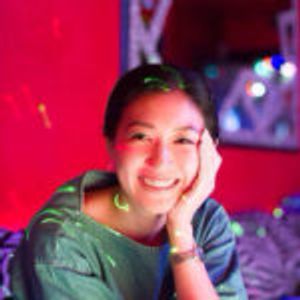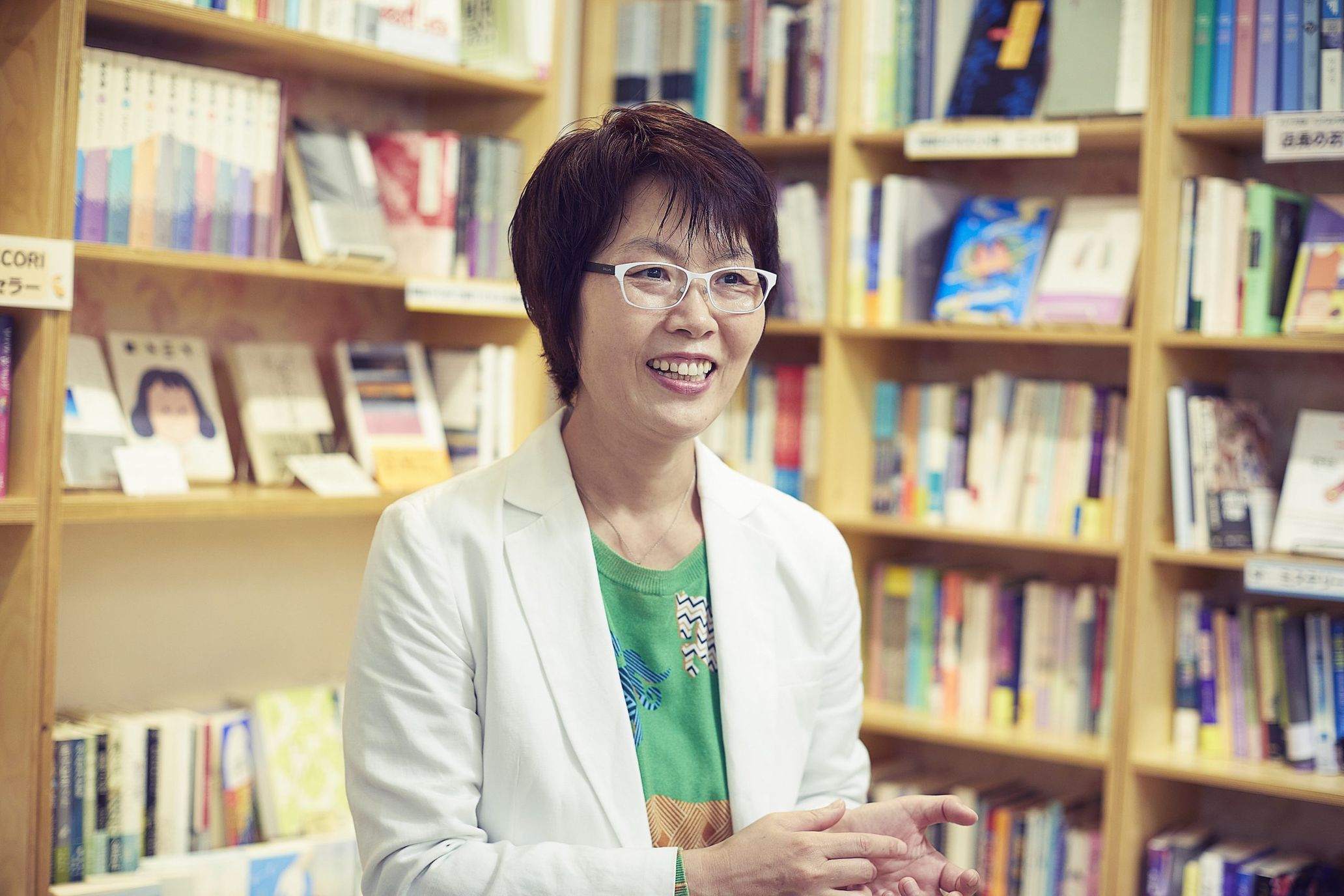
Kim Seung-bok
Kim is the CEO of Cuon. She majored in contemporary poetry in the Department of Creative Writing at Seoul Institute of the Arts. After graduating in 1991, she moved to Japan and enrolled in the Department of Literary Arts at Nihon University College of Art. Having been a voracious reader of Korean poetry and novels from South Korea and her love of literature led her to launch the publishing company Cuon in 2007. In 2015, when she relocated the office, she took the opportunity to open a bookstore with a café called Chekccori, which specializes in South Korean books in Jimbocho, an area known for bookstores.
South Korea is considered both geographically the closest and yet one of the most distant countries from Japan due to its historical conflicts and divergent political views. On the other hand, there are many Japanese who enjoy visiting the country on vacation. The younger Japanese generation is drawn to the Korean lifestyles and values through their exposure to K-pop, K-dramas, and movies. It is not surprising to encounter Japanese students, who diligently follow South Korean culture with enthusiasm and actually consider it as their dream country. In recent years, Cho Nam-joo’s novel Kim Jiyoung, Born 1982 (2020), sold 1.3 million copies in South Korea and was translated and published in 16 countries around the world. It was also made into a movie. The novel’s success sparked interest in South Korean literature among avid fans of K-pop, K-dramas, and films. The novel, which is regarded as a South Korean feminist novel, engendered deep sympathies among women around the world, with some saying that it gave them hope for the coming future era.
Why are Japanese people attracted to novels from South Korea? Makiko Saito, the translator of Kim Jiyoung, Born 1982, noted in her book,『韓国文学の中心にあるもの』(2022), about the strength of South Korean literature, that the popularity of South Korean literature is bolstered by the broad and enthusiastic support of readers. She wrote that the readership is so diverse and cannot be summed up in a single reason or thought. Upon reviewing their feedback, she realized that many people enjoyed reading the books, but more importantly, they provided sensible support in a world filled with absurdity, violence, and perplexity.
The place to find and enjoy South Korean literature in Japan is Checkkori, a bookstore located in Jimbocho, Tokyo. The bookstore’s name is taken from Korean and means “a place for children who finished studying a book at a Korean terakoya (a small private school) to celebrate and express their gratitude for the teacher’s guidance.” The store is a magnet for readers, researchers, and Japanese publishing professionals. It is managed by Cuon, a publishing company specializing in South Korean publications, which was started by the owner, Kim Seung-bok, 16 years ago. At that time, only about 20 translations of South Korean literature were published per year. She spoke of the days going around bookstores tirelessly to get the books placed. She carried on believing in the origin of the store name, which means: “All good things are loved by all and live a long life.” Today, many bookstores have a section dedicated to South Korean literature translated into Japanese, but Kim’s eyes gleamed with passion as she said, “There are still many excellent South Korean books yet to be published in Japanese.”
The world of South Korean literature in Japan relies on connections built by curiosity, passion, and solidarity of interests and ideas.
–-The books published by Cuon cover a range of fields and are usually offered in the form of a series. There are books by South Korean and Japanese intellectuals that evolve around their dialogue and delve into the differences as well as the similarities between the two countries. There are also books on humanities and society that offer insight into the history and psyche of South Korea from different perspectives. I heard that the book series of South Korean literature is highly acclaimed for the book design and the first book that came out was The Vegetarian (2016) by Han Kang, who was the first South Korean author to receive the Man Booker International Prize.
Kim Seung-bok: On the cover of The Vegetarian, I put the number “01” since it was the first book of the series. I was once asked by a bookstore staff, “I see ‘01’ on the cover. How many books are you planning to publish? I need to make space on the shelves.” On the spot, I replied, “24 books.” The plan was to start with six books and then use the profit to publish additional six books. It was not easy to get to where we are today, but we managed to publish 23 books so far. After The Vegetarian was published, I heard someone saying, “My worldview on South Korean literature has changed.” This made me happy. We have to go to bookstores directly to pitch the books and ask to carry them. Otherwise, the readers will never come across the books we published. We have to keep on trying.
–It’s been 12 years since the first book. What are the projects that you are currently focusing on?
Kim: In addition to running the bookstore, publishing books, and connecting Japanese publishers to South Korean publishers, we organize book events and South Korean literature festivals as well as Korean translation competitions to discover and nurture translators. We also published a series of books under the name of “South Korean Literature Short Short,” targeting customers, who are not big readers but are interested in learning Korean. In this series, we featured a short story in Korean along with a Japanese translation so it’s accessible to any readers. In addition to that, we made readings in Korean available on YouTube.
When we find something interesting, we involve other people, who want to be part of the project. We are always looking for something new. If we meet someone that we want to work with, we are persistent about pursuing that person. I think these efforts have led to who we are today. It’s not just me, but it’s thanks to the passion of everyone involved.
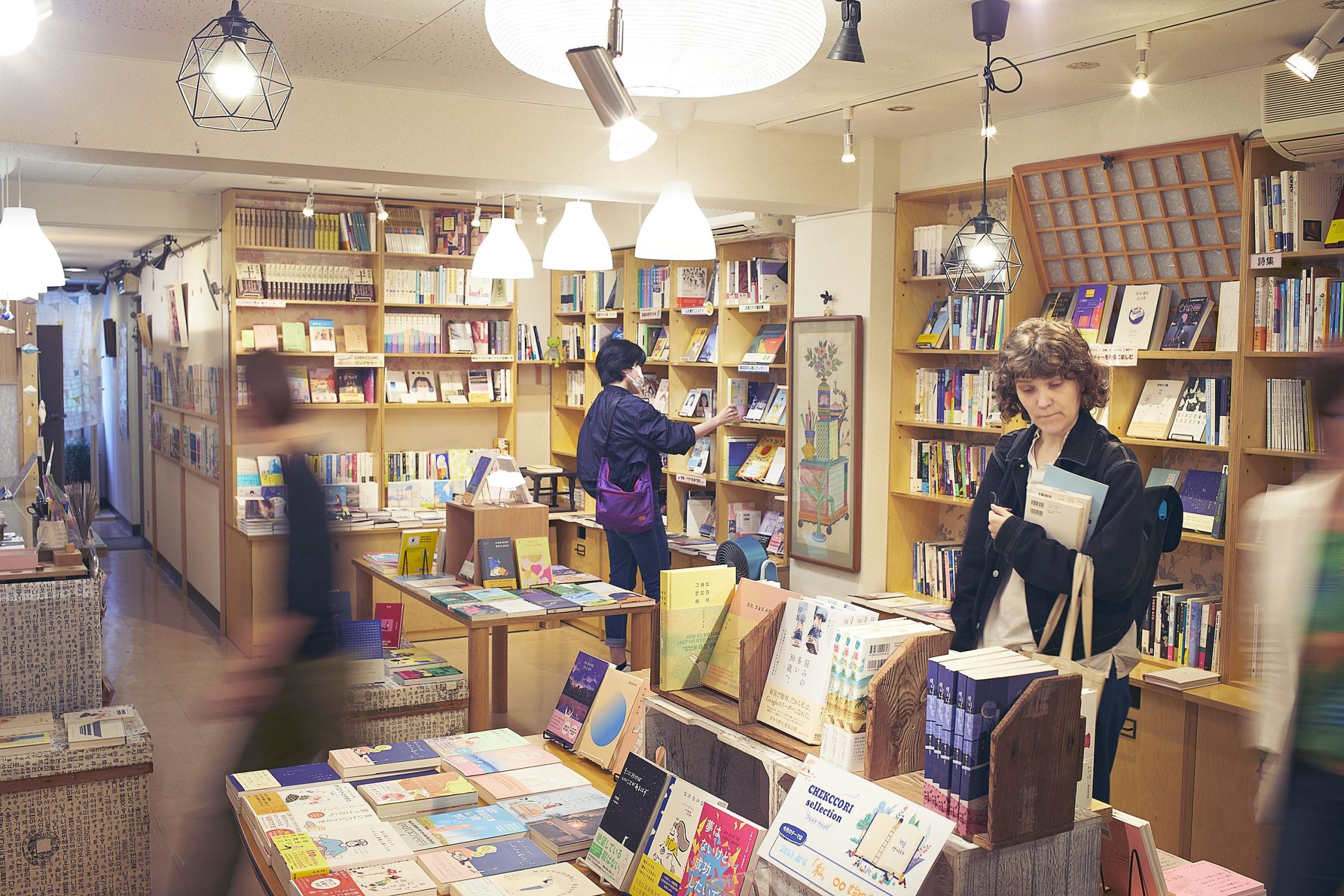
–I attended an online event organized by Chekccori the other day. I heard that you hold about 100 events a year, which I believe is a lot of work. How are you managing the projects? And have you noticed any change in your readership?
Kim: We organize events to nurture a sense of solidarity in the community. It’s not only the readers, but we are also close to our translators and editors, who are on the production side. With them, we often discuss the concept of our next book and how to market it. Over the years, we have built mutual relationships with people who are involved in publishing to expand the market of South Korean literature. Nowadays we can find the South Korean literature section at bookstores in town.
It has been eight years since we started Chekccori, and I feel that the age range of our readers has dropped dramatically with the recent Hallyu boom. Teenagers who are fascinated by South Korea have a sparkle in their eyes from the moment they enter the store, and many readers are looking for books recommended by BTS and Hallyu stars as their favorite reading material. On the other hand, the number of customers interested in history and politics has also increased. Since the start of video streaming services, South Korean movies, and dramas have become readily available, so people seem to feel more cultural familiarity with South Korea. More and more people are saying, “South Korean literature is interesting,” and readers want to pick up different books. Not all books are easy to read, but they are gradually becoming known.
Brave words transcend borders and have the power to make society better
–I saw that there is a collection of poems published by Cuon. I sensed that literature and essays strongly appeal to the readers’ societal awareness. When it comes to poetry, how is it positioned in South Korean literature?
Kim: South Korea is a country that follows the tradition of Confucianism. In that context, reading books, composing poems, and reciting them are considered something very important. Literary figures are still respected today. So far, we published two books of South Korean poetry from Cuon as part of our poetry series, “Selection Korean Poetry.” The first one is Han Kang’s Put The Evening In The Drawer (2013). On the book band, it says, “Words of poems lead you to recover.” South Korean novels in Japanese are published in Japan nowadays, but there are very few contemporary South Korean poems in Japanese. We hope to introduce more of them. If our poetry books do well, I am sure Japanese publishers will be interested and that could lead to having more of them published.
In Japan and South Korea, the ways people express joy and sadness are slightly different. In Japan, tanka and haiku are popular. I saw that tanka is still popular among the younger generation, especially on social media. However, in South Korea, it’s poetry. People post short poem-like sentences with sleek backgrounds online. It almost feels as if this format is a staple of contemporary poetry in South Korea. Many people call themselves poets. (laughs) In other words, people of all ages are writing poems daily.
–Many South Korean feminist books, such as Kim Jiyoung, Born 1982, have been translated into Japanese. Readers commented that they were encouraged or started to think about feminism and history in Japan after reading the works. It feels that South Korean literature created an opportunity to catalyze solidarity among women. Do you think Japanese readers feel a sense of affinity with the works of contemporary Korean authors? Conversely, did Japanese literature have any influence in South Korea?
Kim: The reason why so many essays by contemporary writers are read in Japan is that South Koreans and Japanese have similar sensibilities and can easily empathize with each other. In addition, the number of Japanese books translated and published in Korean is more than 10 times greater than the number of Korean books translated into Japanese, indicating that young South Koreans identify with Japanese literature. Although we speak different languages, I feel that we are in the same cultural sphere.
There is a well-known episode of Kim Yeon-su, one of the most famous novelists in South Korea today. He decided to become a novelist because he learned a new way of writing novels by reading Haruki Murakami. He was born in the 1970s and the novels he had read until then were mostly weighty works about North and South Korea, the Korean War, ideological battles, and so on. This naturally left an imprint on him on how novels were written. Therefore, when he encountered Murakami’s works, he felt that he could write novels with a sensibility that readers may understand his feelings without touching on complex themes.
Murakami’s works, written in the first person, have had a major impact on Kim Yeon-su to the extent that they completely changed his concept of what a novel is. It’s not only Kim Yeon-su, but also Han Kang, Kim Jung-hyuk, and Kim Young-ha, who are now writers in their mid-50s, have written superb novels, which are greatly appreciated all over the world. One of the most appealing features of South Korean literature is that their works depict personal stories while at the same time cleverly incorporating the history and social issues of the country.
Japanese people seem to feel that heavy and painful South Korean novels express their thoughts. On the other hand, South Koreans are drawn to Japanese novels that depict soothing moments in daily life and happiness. It is the same with movies. While most South Korean movies are intense and have a strong message, Japanese movies are also very popular, and some get fixated on the leading male characters. It’s interesting as they are complementary.
“Good books prompt people to act after finishing reading them”
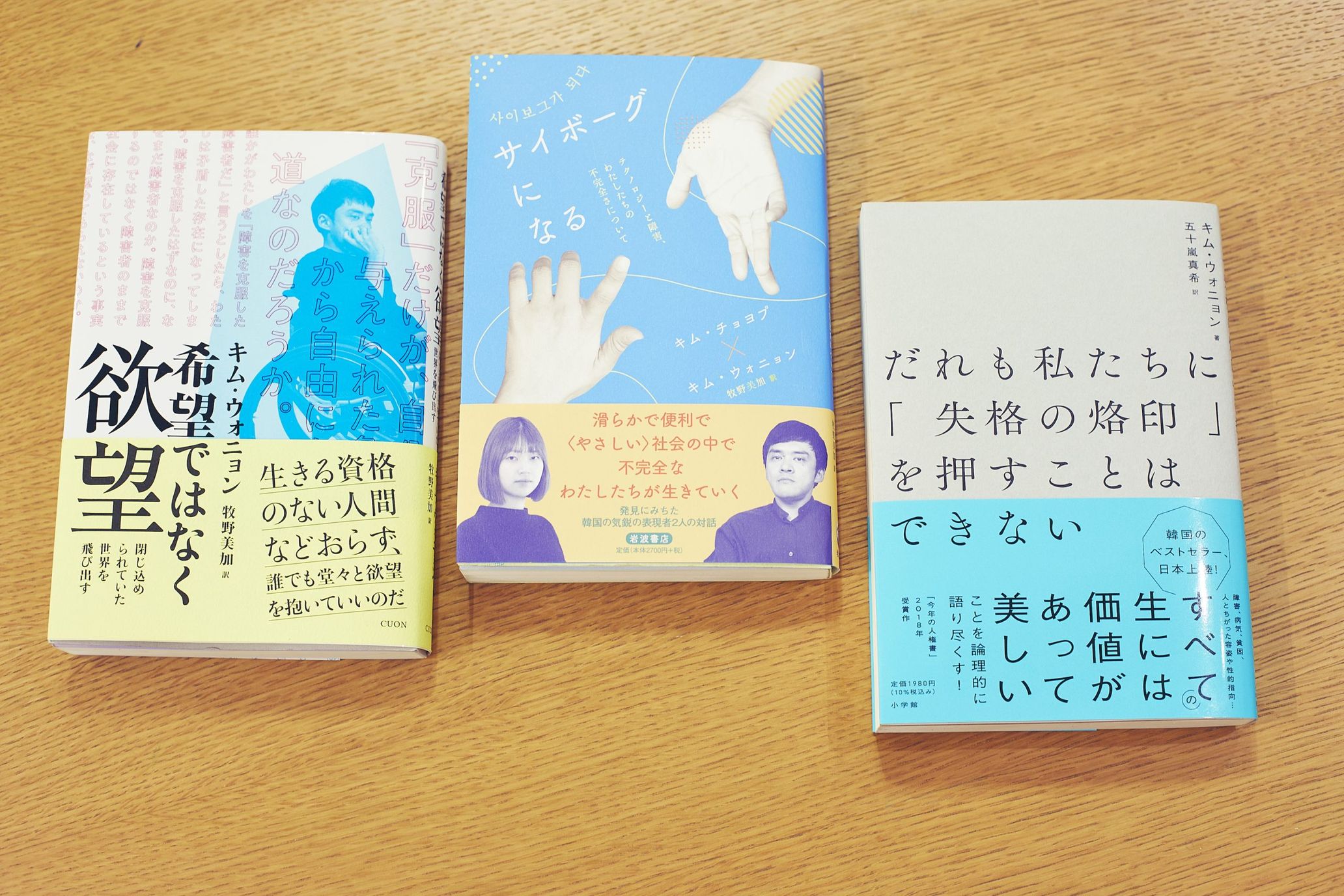
–In addition to Cuon, you also serve as an intermediary between Japanese and South Korean publishers. At the end of last year, three books by Kim Won-young, translated into Japanese were published around the same time. The first book, Desire Instead of Hope: Why Desire Should be Equal (2022) was published by Cuon, followed by The Case for ‘Wrongful Life’ (2022). If the first book was about the power of freedom and solidarity, the second one was about defending the disabled, the poor, and the sexual minorities. The third book, Becoming a Cyborg (2022), was co-authored with Kim Cho-yeop, the rising star of the new generation of South Korean science fiction writers. It presents a stimulating dialogue on examining technology not as a treatment to reach perfection but to live better with imperfection. What prompted you to introduce these books to Japanese publishers?
Kim: I came across Desire Instead of Hope as I was looking for a book written in Korean by an author with disabilities. This was after I read『家族だから愛したんじゃなくて、愛したのが家族だった』(2020) by Nami Kishida, a delightful account of the author’s daily life with her brother with intellectual disabilities.
All of Kim Won-young’s books were deeply thought-provoking, unlike Kishida’s book, which was enjoyable to read. After I read them, several Japanese editors came to my mind who might be interested in the topic or see them as a way to expand the distribution channels. I immediately sent a proposal and asked them to read the book to which they responded promptly. They decided to publish the books right away. Good books prompt people to act. In my case, if I think it’s fun, I will take action instantly. If it’s not fun, I quit right away and start something else right away. (laughs)
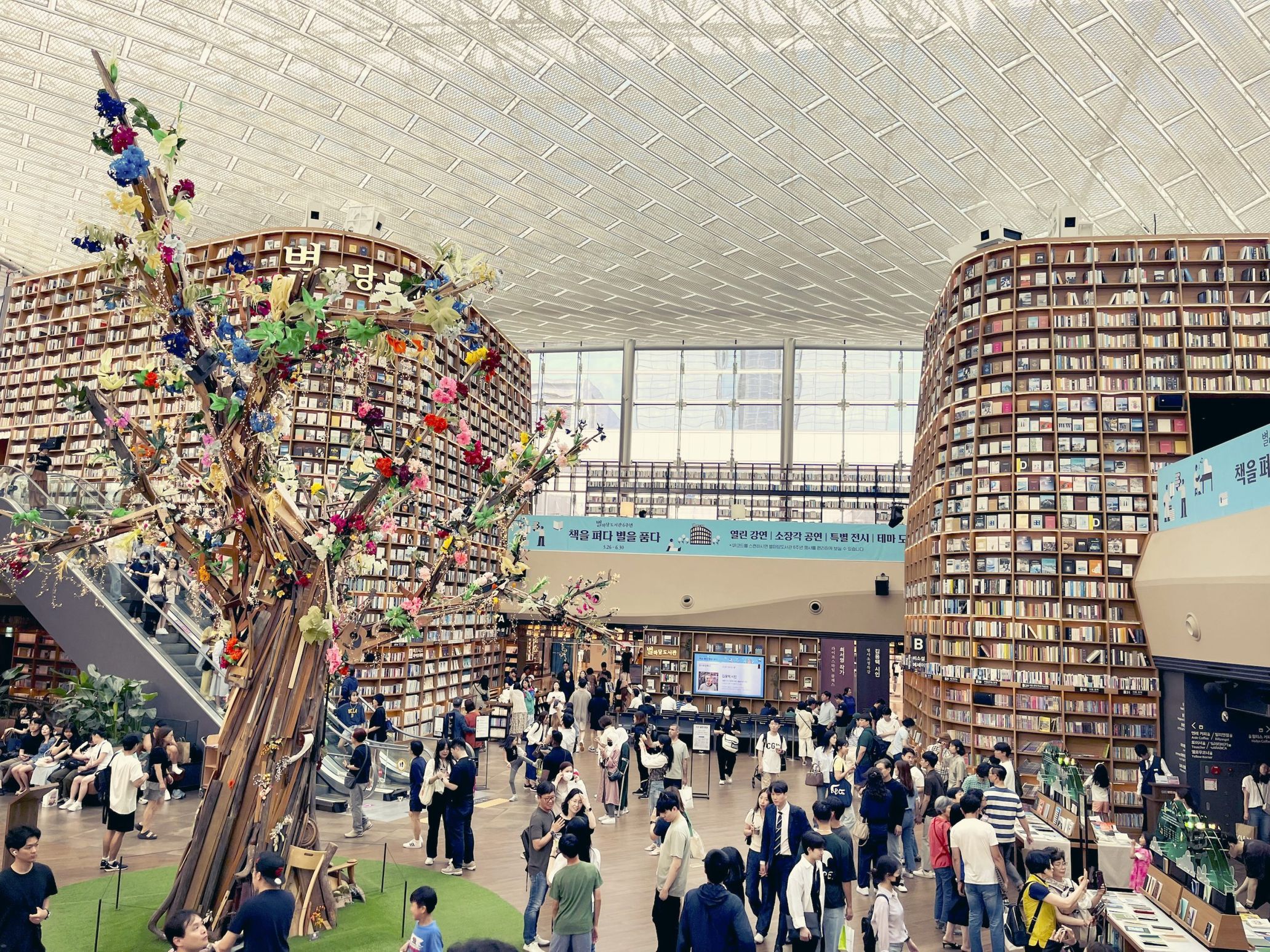
We are planning to move to a larger store in the near future. The plan is to feature books from different countries every month and organize events. In 2019, we organized an event with book critics and translators titled, “Invitation to Asian Literature @ Chekccori” to introduce works from Thailand, Tibet, and China. This led to our involvement in the publication of 『絶縁』(2022), an anthology of popular authors from nine cities in Asia. Thanks to the book, it generated interest in Tibetan literature, which led to having the novel being nominated in the translation category of the Japan Booksellers’ Award and eventually to the publication of a book. These are good trends. I heard that South Korean literature is a model case for how to draw attention to Asian literature in Japan. I would like to collaborate with those who are involved in Asian literature in Japan to build momentum. The people who will benefit the most are the Japanese-speaking readers who can read Asian literature in their language.
Earlier this year, I introduced a North Korean novel, Friend: A Novel from North Korea (2020) by Paek Nam-nyong to a Japanese publisher and the book came out. Since Korean is spoken in North Korea and Yanbian Korean Autonomous Prefecture in China, I would like to introduce a variety of works written in places other than South Korea to readers in Japan in the future.
*Kim Won-young was diagnosed with osteogenesis imperfecta at a young age and went through a number of hospitalization and operations while growing up. He lived only in the hospital and at home until age 14. When he was 15, he entered the middle school of a special needs school. After attending a general high school, college, and graduate school, he went on to become a lawyer. He is also a writer and performer.
Photography Seiji Kondo
Translation Fumiko.M

